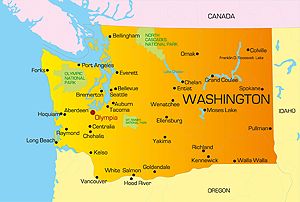A portal website bringing together vital information about natural gas and natural gas vehicles.
 | Washington state has a decal fee for natural gas vehicles - see schedule below. Washington offers several incentives for owners of AFVs including a tax exemption of sales and use taxes, a loan and grant program, and an inspection exemption. The state legislature has passed legislation to incept pilot projects for alternative fuels corridors within Washington. AFVs are required to have a special marking on the vehicle identifying the vehicle as being powered by an alternative fuel. Further, the state has passed a 30% clean vehicle requirement for all state fleets, and has also passed a separate "ultra-low carbon" requirement for purchasing or converting state fleet vehicles.
|
Point of Contact
Stephanie Meyn
Clean Cities Coordinator
Western Washington Clean Cities Coalition
Phone: (206) 689-4055
Fax: (206) 343-7522
stephaniem@pscleanair.org
http://www.wwcleancities.org/
| Legislative Session Dates: | January 13 - March 13 |
| Legislature Website: | http://www.leg.wa.gov/pages/home.aspx |
This state was last examined and updated in November, 2016.
